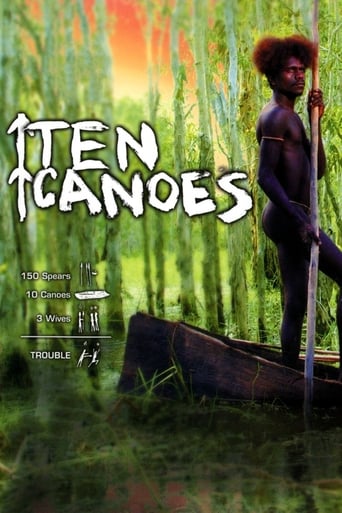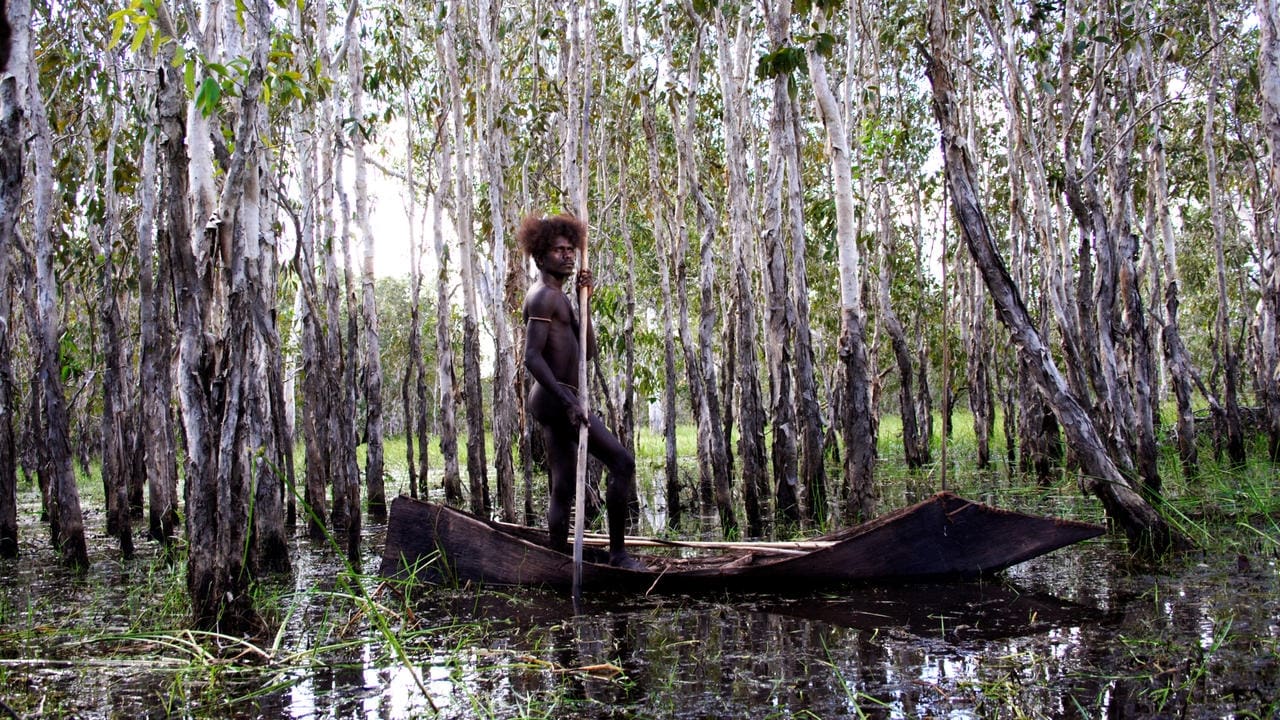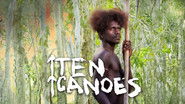sharky_55
For a country whose notion of Indigenous Aboriginal culture comes up to The Dreamtime and dot paintings, Ten Canoes might well serve as a lovely refresher course, never mind how Hollywood might react to it. Growing up I recall being fed healthily on these stories as part of an ever-enthusiastic brand of multicultural education, and relishing them because it was easy for even kids to imagine how the ancient storytellers had come to these conclusions by simply looking around them and rewinding. How the stars in the night sky are camp fires burning brightly to guide hunters home, how the rivers are water goannas larger than you or me could ever comprehend, or how the great emu losts its wings because of its own arrogance and pride (Icarus being just pipped on that one). Another tells the story of how the kangaroo was bestowed its pouch because of the kindness it showed towards Byamee, a god disguised as a troubled wombat. What these stories, and what Ten Canoes shows us, is that even as many millennia separate us, our inherent laws and practices are guided by a karmic belief of cause and effect, often with wry consequences. Fair is fair; the universe ensures that you will always get what is coming to you, and it isn't afraid to get creative. Who better to champion the oral traditions of the Indigenous Aborigines than David Gulpilil? He is without a doubt the most mainstream and well-known of the Aboriginal actors, and retains a delighted curiosity from his first ever screen- credit way back in Nicholas Roeg's masterpiece, Walkabout. In that he played a young boy on the eponymous rite of passage, who positively gurgled when asked to demonstrate his knack for finding water in barren desert, and channeled this fevour elsewhere in his mating dance. Gulpilil has lost none of that fresh-faced charm, and although we cannot see his grin, it is easily identifiable in his narration. It is not quite Attenborough; the storyteller observes with an all- seeing eye, but is not afraid (as we might suspect) to insert his own footnotes here and there, and sometimes chuckle along. Rolf de Heer alternates black-and-white and colour stock as if to mimic dusty old storybooks (if they had they kept them) being brought to life orally, and Gulpilil can't always bear to remain impartial. Which is how most of us like our stories told, with a dash of flavour and colour. de Heer uses the visual as a way of representing an age-old reverence for the land. The Aborigines were nomadic hunters and gatherers, never taking more than necessary, and ensuring that the land too could live and breath beneath the soles of their feet. The cinematography is almost sensual; the camera snakes steadily around tangles of bush and grass, like the hunter making his slow advance, or glides serenely, as if it was also balanced on the canoes the men themselves craft out of tree bark. The water's mirror must not break, the ever-constant buzz of the outback unable to be interrupted. At times it simply lingers, and we see how the landscape twitches, and shimmers in the heat. The story is in fact three stories within one another, of one narrator performing for the gathering around the camp fire, and another using a fable as way of caution. So there are thousands of years connecting the story strands, and the film decides to strengthen them using first and foremost humour, and through showing how it has not aged a day from the past. Fart and dick jokes are means of confronting the modern audience, to force a connection that has not been recognised until this moment. And then we see how their morality system has manifested from lifetimes of incidents and misunderstandings. This is a little further from our own comfort zone, a ritual of justice where spears are thrown until the guilty is wounded. So it is shocking when the conclusion, somehow, manages to make sense: "We've speared your man," says one tribe to another, who respond "who speared ours". Perhaps it is Byamee's way of pushing responsibility towards Yeeralparil, who makes the costly error of lusting after his brother's three wives, and through cruel fate, finds the pleasure turned into burden suddenly thrust onto him. We may not subscribe to the spear for a spear ideology that they practised long ago (indeed we have better method not available to them), but somehow we keep making the same mistakes, and punishment happens to chase us out eventually. And yes, we are still prone to laying around all day and eating honey, although we have made an efficient business out of it. The belly laughs when we are caught with sticky fingers still sound the same.
hupfons5
The best film I've seen about the aboriginal culture of Australia.After watching this film for 10-15 minutes, the viewer either will be intrigued by the story, acting & cinematography or convinced that it's not to their liking. If you enjoy cinematic art, you will be rewarded richly by De Heers' respectful portrayal of the indigenous people their humor, hunting and gathering expeditions, and everyday life in the lands where they and their ancestors lived and died for centuries.The aboriginal cast speaking in the native language of Ganalbingu adds a degree of authenticity that few film makers ever capture and that enriches the viewing experience. Watching this production is akin to being an unseen visitor in a world that is so different from any that most of us will ever encounter or imagine.To heighten appreciation of the tremendous effort and care that went into making this film, I highly recommend watching the Special Feature entitled BALANDA & THE MAKING OF TEN CANOES.
movedout
Australia's 2007 Oscar entry is a wry gem of a film that translates our contemporary values schema into a morality play set a thousand years ago in an indigenous tribe settlement somewhere near the Arafura Swamp in Australia's Northern Territory. Iconic Aborigine actor David Gulpilil (of "Walkabout" and "The Last Wave" fame) eloquently and drolly orates the film's triple narrative of native Australian lore that concerns itself with coveting, revenge, sorcery and even a dash of penis envy. Remarkable in its scope and mesmerising in its photography, director Rolf de Heer's idiosyncratic fascination with the interaction of human nature against nature is condensed into a simple but effective lesson of history repeating itself. Possibly venturing to rail against critics of the noble savagery belonging to the Aborigines, "Ten Canoes" allow us the positive enlightenment that comes from observing a different and alien culture operate on levels familiar to us.
swillsqueal
None of the people who play roles in "Ten Canoes" are professional actors. Well, maybe one. In this way, Rolf de Heer's approach reminds me of Pier Paolo Pasolini's, especially in "The Gospel According to St. Matthew". "Ten Canoes" begins. Hear the insects, the birds? Of course, you do. You are literally over Arnhem Land in what is now the northern part of Australia--nearest big city, Darwin. You seem to fly, maybe like a spirit from the tribal waterhole. We all begin in a waterhole, well maybe not all. You will see it soon, if you see "Ten Canoes". The story goes that before you are born, you may ask your father who your mother will be. When you die, your soul returns to the waterhole and there you wait to ask your next father the same question.Spirits are everywhere, in everything. Animism, you say. Maybe yes, maybe no. In any event, this is a story within a story, wrapped in another story. The narrator tells of the time when a younger brother wanted to get married, but all the women in the clan were already taken. His older brother had three wives. The younger brother lusted after the youngest wife of his older brother. Perhaps, his older brother was not able to satisfy all three of his wives.The narrator lives in the present. He is telling the story of the younger brother, who in reality, as an actor in this film, is his own son. Yes, the son is playing the narrator's ancestor. And why not? He plays his own ancestor in the story which his older brother tells him about a time very, very long before, when the people were different, yet acted the same and a younger brother coveted one of his older brother's wives. Are you confused? Don't be. You'll be fine. The older brother tells this story, a tale set in the deepest past. He tells it to his younger brother because he knows about his brother's lusts. He's actually been told by the younger brother that he needs a wife and that that wife should be the older brother's younger wife. The older brother tells this story as the brothers and others in their very extended family engage in a hunt for geese and goose eggs in the swamp. They need canoes for this expedition and in the ways which have been passed down by ancestors, they construct ten of them made from tree bark. This is a secret, you'll love to watch.The contemporary narrator lays this all out for you and even tells you about "the cross river mob". His language is a bit different. He is of the present. He has been living amongst European settlers. The tales told by him have taken place long before any European landed in Australia, long before the Dutch touched the beaches of Western Australia in the early 17th Century. Yes, long ago, but still close enough to see.The tales are told of a time very much unlike our own. It was a time and place where humans lived in communities without private ownership of Nature, without money, without rents, without wages, without a State, without classes. It was a very different time. Not a wholly bad time nor a wholly good time. This was just a very different time, a time and place where different things mattered to people and where people mattered more than things. It was a time when what you did with others was all shared more or less equally and what you did for yourself was yours, if you wanted it that way. Women are seen gathering nuts together for the tribe. Men are seen hunting geese for the tribe and sleeping on hastily constructed platforms in trees, with fires going all night to repel the mosquitoes. Children run free and, in fact, belong to all. The sense of time is not one of clocks. It is long. It is without meaning except perhaps as a river flow has meaning.If you want to experience this kind of time and place, I urge you to see "Ten Canoes". It's an experience in story telling which you won't forget soon. It has humour, beauty, life, love, death and joy. It is a story about when dreams come true....he, he...



 AD
AD



